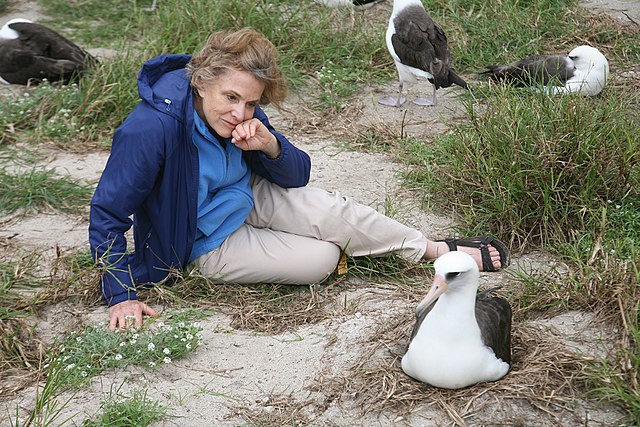Get to Know a Frog, or a Worm, or a Fish Says Sylvia Earle; Everybody has a vote. Use it to help sustain the environment

Oceanographer Dr. Sylvia Earle spends a moment with Wisdom, a Laysan albatross. US Fish and Wildlife Service Headquarters, Wikimedia Commons
Editor's Note: Sandi Smith's interview with Syvlia Earle some 13 years ago doesn't seem out-of-date as the lady herself is just as current*. She will turn 79 on August 30th, 2014
Speak to Sylvia Earle for any length of time and you soon realize that no matter what questions you ask, the talk always returns to ecology and conservation of our oceans. No surprise there — she's spent her life increasing our knowledge about life under the sea. She doesn't preach, but simply and logically presents the facts. "We're not apart from nature, we're a part of it. And to the extent that we continue to damage the natural systems, we are jeopardizing our own future."
At 65 Earle has no intention of retiring. "I'm just beginning as far as I'm concerned. Right now I'm in the process of writing an ocean atlas for National Geographic. No one has ever done an atlas for the ocean before. It will sum up what we know. But there is so much that we don't know."
Leading the way and setting records comes naturally to her. "When you really want to do something, you find a way to make it happen. I remember wanting to go to sea and being told that women were bad luck as recently as the sixties." She often was the only woman aboard during early expeditions. She led the first team of women aquanauts who lived underwater for two weeks in 1970. Earle was the first solo diver to descend to 1250 feet without a tether. In 1985 she piloted a remotely operated submersible to 328' feet. Between 1990 and 1992, she served as chief scientist of the National Oceanic and Atmospheric Administration — the first woman to ever hold the position.
The head of more than 50 worldwide expeditions and author of more 100 books and articles about marine science and technology, Earle says, "The more you discover about our oceans, the more you find there is to discover, so you just keep going." I caught up with Dr. Earle at her Oakland, California home between explorations for the National Geographic Society. She serves as explorer-in-residence and was heading out to sea again the next day.
Earle grew up on a small New Jersey farm with her two brothers. "My mother advised me that I'd have to get used to the idea that there were things my brothers could do that I couldn't. I thought that was absurd." The family moved to Florida for a better climate when she was 12. The Gulf of Mexico became her back yard, which increased her fascination with biology and the oceans. "I had the Gulf as my personal laboratory. I observed and explored and took careful notes."
Was it difficult for a woman to get started in ocean sciences during the sixties? Earle said that when she decided to become a botanist, she met considerable resistance to the idea of a woman being involved in any science. "Women were discouraged. But I didn't listen to the people who said science wasn't appropriate for women. I just knew I wanted to work with plants and animals, and the oceans have the greatest diversity in life on the planet."
Her lifelong love of the sea began on a family vacation to the Jersey shore when she was three. I asked what the attraction was and she said, "Critters. Horseshoe crabs on the New Jersey beaches were irresistible and I still find them irresistible. Since then I've learned about the existence of so many other creatures and it just gets better. I always preferred frogs to dolls. And I watched people bring sick animals and birds with broken wings to my mother to take care of."
More Articles
- Ferida's Wolff's Backyard: The Snow Turned Into Snowy Rain As It Fell From The Trees. Still Lovely ...
- Jo Freeman Writes: END FOSSIL FUELS NOW Marchers Tell Biden
- Women's Health and Aging Studies Available Online; Inform Yourself and Others Concerned About Your Health
- Ferida Wolff's Backyard: Awesome Goldfinches, Part of the Incredible Possibilities That Nature Might Offer
- Ferida Wolff's Backyard: Nature’s Jigsaw Puzzles
- Julia Sneden Wrote: Love Your Library
- Rebecca Louise Law: Awakening on View at Honolulu Museum of Art
- Ferida Wolff's Backyard: Dandelion Landing
- Ferida's Wolff's Backyard: A Nest!
- What Are You Worried About?* Protecting Water Supplies and Power Generation by Propping Up Lake’s Powell's Level






